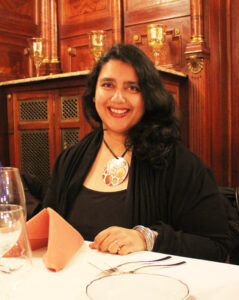Be spontaneous and cook with abandon, says Ishita
Dubai-based Ishita Saha is going great guns with her culinary travel blog featuring Dubai, Kolkata and the world beyond. Ishita, who studied in St Xavier’s College, Kolkata, is a gourmet and loves traveling. She has been nominated for ‘Best Blogger’ in BBC Good Food Middle East Awards 2014. Currently, Ishita is the editor of UAE’s first Food and Travel E-Magazine – the Food e Mag dxb.
The 40-year-old is highly talented, personable and extremely erudite in gastronomic matters. From Kolkata to Dubai, Turkey to London, what excites Ishita the most is exploring the gastronomic hotspots. And, of course talking about Kolkata, Bengali food and organizing special Bengali food pop ups in Dubai.
In a freewheeling interview with Pankaj Adhikari, Ishita talks about her penchant for food, culture and her incredible journey into the fascinating and appetizing world of gastronomy.
What prompted you, a student of economics, to start writing this blog? Have you been influenced by Oscar Wilde who said: “I can’t stand people that do not take food seriously.”Food and travel had been ingrained in my sub-consciousness from my very childhood. My father’s profession took us from one place to another within Bengal, and we accompanied him for all his official tours. We would visit remote places and traveling naturally entailed tasting of food at these locales, prepared by local folks. There was no conscious attempt to write on food or travel but it happened organically at a much later age when I started my quest for learning more about Bengal’s food and culture. At this stage of my life, yes I do believe in Oscar Wilde’s quote, but not when I started!
Dining is an integral and indispensable part of social life…how would you explain cuisine vis-a-vis culture?
Any cuisine is an integral part of its culture – these two are inseparable. The evolution of civilization has been on the basis of finding food and figuring out its nuances. Interestingly, the more layers of intricacies a cuisine has, the richer it’s culture and history. A discussion revolving food is always the first one to break barriers between two strangers – food connects people through their hearts and dining is a very social phenomenon.
Do you subscribe to the view – “Cookery is not chemistry; it is art. It requires instinct and taste rather than exact measurements.”
Yes, for me it is an art. I believe that you need to be spontaneous and cook with abandon. Thinking comes prior to cooking, but once you don your apron and have the ladle in hand, you have to give into your creations. I also believe that there is nothing like ‘this is right’ and ‘this is wrong’. If the dish is palatable and leaves you satisfied – visually and in taste – the cooking had been perfect. I am an experimental cook, having gotten into the kitchen much after my marriage and without having the preconceived notions of ‘my mum cooked it this way’. I picked up from everyone and everywhere as I went along. At the end, your ingredients are your colors, your cooking pan is the palette where you mix colors, and when you serve your food – that’s your exhibiting canvas.
Indians in general have an incredible passion for Chinese cuisine (we’ve Indianized it, though)…your take on this trend…
It’s intriguing because in a country with a strong colonial hangover, if a foreign cuisine that has left any impact is Chinese. It’s because of the mixed spice palette in Chinese food – the chilli, ginger, garlic that have connected to the Indian taste buds. Also, don’t forget the rice! Interestingly, the love for Chinese food in India spread mainly from Kolkata’s Chinatown.
As a Bengali, a quintessential lover of fish, how will you compare Bengali cuisine vis-a-vis other Indian regional cuisines?
Traditional Bengali food is very elaborate with lot of regional variations in the way a same dish is cooked. Again, no other Indian cuisine can boast of so many cultural amalgamations. Bengali cuisine is very subtle and is very balanced, if served in a traditional way – vegetables as starters to daal, rice and fish or meat served as the main course; it ends with chutney as the palette cleanser, to be followed by desserts. Unlike other regional Indian cuisines, different dishes focus on different spices – you don’t use all the spices stacked in your spice shelf all together!
Dylan Jones said: “Recipes don’t work unless you use your heart.” Your comments…
Of course… nothing works unless you use your heart and here you’re talking about food, which involves all your five senses. However, I feel if you use your heart, you’ll have to deviate from your recipe (except in baking) because you will be putting in elements based on nostalgia or preferences of the person you’re cooking for!
At a time when people are health conscious, what are your tips for these health freaks?
Being conscious about health is definitely a good thing, but being a freak might take things to the extreme. I feel that in our quests to try out new things in our lives – including food, we are moving away from the food that our bodies are genetically used to for centuries. This leads to a huge conflict internally and the pace of our modern lifestyle adds up to the stress. My suggestion would be to go back to basics – buy in moderation, you’ll the cook in moderation, and you will be naturally eating in moderation too.
What’s your advice to the aspiring candidates who are pursuing career in food and beverage…
Let your passion lead you. Also, if you’re cooking for someone, the food has to appeal to that person. There’s no ego here. Learn, observe, read books and travel. If you’ve a lot of things to learn from great chefs, there are things to learn from little-known cooks in street corners. And probably the best culinary school is home, from mums and grand mums – unknowingly they have been using many culinary techniques since centuries!
Your work entails a lot of travelling in many parts of the world. You’re aware that globally, travel and tourism industry is the second biggest money-spinner after oil industry. How do you foresee the growth of travel and tourism industry in India?
Indians are travelling like never before. You go to any part of the world – you will find an Indian traveler. Also, India has sealed its image on foreign travelers as a spiritual and a diverse cultural haven. However, I’d love to see more growth in tourism and improved infrastructure across the country.
Please share your experience at a world-class institute, which you might have visited where training for food preparation is imparted…
Only recently, I had an opportunity to learn from celebrated chefs associated with Michelin starred restaurants, in the Emirates Academy of Hospitality Management in Dubai. One thing I’ve learnt from most of these celebrity chefs is: keep it simple and focus on one ingredient that is going to be your star ingredient. The simpler your food is, the tastier it is.

